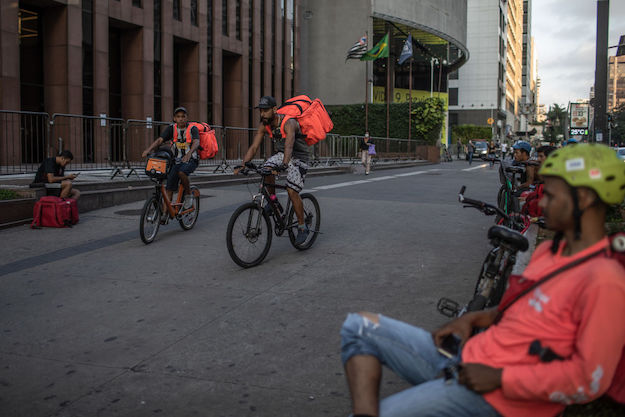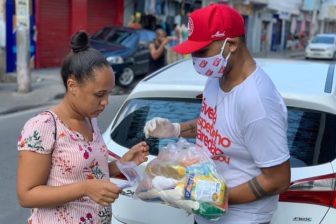SÃO PAULO – At the beginning of April, delivery app Rappi unveiled a controversial new policy for its riders in Brazil’s biggest city: a new ranking system to determine which delivery pros would be given access to rich neighborhoods in the middle of town. Only those who worked enough extra hours or on weekends would make the cut. The rest would be relegated to the city’s fringes – where demand is low, rides are long and pay is worse.
For many of the city’s delivery riders it was a step too far. On June 5 they staged a protest outside the São Paulo Museum of Art, calling for better working conditions and more secure pay. It was the latest in a region-wide backlash from some riders who, already facing precarious work conditions and despite their “essential” role in making quarantine more bearable, say their income has declined amid increased competition for orders with the onset of COVID-19.
“(The company) is taking advantage of the COVID crisis. We need this work to feed our families, our fate is in their hands,” Carlos Roberto da Silva, a bicycle delivery rider from São Paulo and one of the protest organizers, told AQ.
One recent study from the University of Campinas found that almost 70% of delivery workers (both bike and motorcycle riders) had received less compensation since social distancing was implemented in Brazil. Both Uber and Rappi say the study is methodologically flawed and have not accepted its findings. But some protesters say their experience fits with the study’s results.
One recent Sunday, Da Silva left his house to work at 11 am and came home at 10 pm. He said during this 11-hour shift he managed to earn 12 reais, approximately $2.50.
Factors related to the pandemic have likely lowered per ride payments for many delivery drivers. Restrictive social distancing rules and a spike in unemployment rates created an army of new people ready to work for delivery platforms. But even with so many people staying home, it’s unclear whether demand for food delivery has increased enough to compensate for the surge in available riders.
As a result, delivery workers from across the region have started to organize. Protests like the one Da Silva helped start have happened across Latin America in recent months, many of them aided by social media.
On July 1, Brazilians launched a nationwide strike called #BrequeDosApps (#StoptheApps) to call for higher salaries and better health and safety protections not just for delivery riders, but for transportation app workers in general.
And with the hashtag #YoNoReparto (#IDon’tDeliver), bike workers summoned their forces on Twitter to strike on May 29 in countries like Argentina, Chile, Costa Rica, Ecuador, Guatemala and Mexico.
The protesters main concerns were low wages and a lack of protective equipment and sanitary measures offered by the delivery companies. But even before COVID-19, health issues were a major problem for those who make a living from cycling the crowded streets of São Paulo.
“I have a lot of colleagues that were forced to stay home after getting pneumonia from a late night working. We should get some kind of health insurance. We lack not only decent payment, but also support from those companies,” Bruno da Costa*, a delivery driver, told AQ.
Da Costa depends heavily on these apps. During the day, he is a Rappi-employed shopper in a supermarket. By night, he spends another five to six hours making deliveries on his bike.
Recently, Uber Eats and iFood each announced that they would create a $4.7 million fund to support workers with COVID-19. Rappi also has a similar fund, but has not disclosed its value. Brazil’s federal government has also launched a three-month 600 reais emergency payment program to unemployed and informal workers, which includes delivery workers. Members of President Jair Bolsonaro’s government said on June 30 that they would extend the emergency income initiative until September.
An Uber Eats spokesperson said the company is providing hand sanitizer and masks to those riding for the app. But some advocates say that health and safety steps shouldn’t be left up to the whims of companies themselves.
“In the real world, this is a nice speech with the appearance of worker solidarity. However, there are several initiatives from the state trying to hold them accountable,” Dr. Ludmila Costhek, a researcher University of Campinas, told AQ.
Addressing the issue
In search of higher pay and better working conditions, groups in Brazil have started delivery co-ops of their own. In the state of Minas Gerais, Dizzy Express has tried to attract clients through transparency, and by offering the same price for deliveries regardless of the time of day or spikes in demand.
In São Paulo, several similar services are already out on the streets. Without the resources to create their own apps, many use the messaging service WhatsApp to keep track of deliveries.
“We need an egalitarian distribution of profits among workers, and we know that this is not what is happening out there,” said Marco Henrique Melleti, co-founder of Sinkro, a co-operative delivery service.
It’s not just the workers themselves who are trying to address this problem. State attorneys and scholars in Brazil have also been trying to find out ways to promote social safety nets for those working in the gig economy. Many of these efforts aim at holding delivery app companies to account. In April, for example, the São Paulo district attorney’s office was awarded a legal injunction that would force app companies to pay workers with sick leave caused by the coronavirus, though the companies can still appeal.
“These delivery workers play an essential role in society, creating a division where a group is able to take social distancing measures and the other isn’t,” Costhek said. “Those who can stay at home are getting meals, groceries and medicine from those who can’t.”
* Da Costa requested that his name be altered for safety concerns
__
Strano is a freelance journalist based in Brazil








